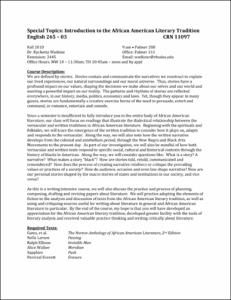Please use this identifier to cite or link to this item:
http://hdl.handle.net/10267/15458| Title: | ENGL 265-03, Introduction to African American Literature, Fall 2010 |
| Authors: | Watkin, Rychetta |
| Keywords: | English, Department of;Syllabus;Text;Curriculum;2010 Fall |
| Issue Date: | 25-Aug-2010 |
| Publisher: | Memphis, Tenn. : Rhodes College |
| Series/Report no.: | Syllabi CRN;11097 |
| Abstract: | We are defined by stories. Stories contain and communicate the narratives we construct to explain our lived experiences, our natural surroundings and our moral universe. Thus, stories have a profound impact on our values, shaping the decisions we make about our selves and our world and exerting a powerful impact on our reality. The patterns and rhythms of stories are reflected everywhere, in our history, media, politics, economics and laws. Yet, though they appear in many guises, stories are fundamentally a creative exercise borne of the need to persuade, extort and command, or romance, entertain and console. Since a semester is insufficient to fully introduce you to the entire body of African American literature, our class will focus on readings that illustrate the dialectical relationship between the vernacular and written traditions in African American literature. Beginning with the spirituals and folktales, we will trace the emergence of the written tradition to consider how it plays on, adapts and responds to the vernacular. Along the way, we will also note how the written narrative develops from the colonial and antebellum period, through the New Negro and Black Arts Movements to the present day. As part of our investigation, we will also be mindful of how both vernacular and written texts respond to specific social, cultural and historical contexts through the history of blacks in American. Along the way, we will consider questions like: What is a story? A narrative? What makes a story “black”? How are stories told, retold, communicated and remembered? How does the process of creating narrative reinforce or critique the prevailing values or practices of a society? How do audience, occasion and even law shape narrative? How are our personal stories shaped by the macro stories of states and institutions in our society, and vice versa? As this is a writing intensive course, we will also discuss the practice and process of planning, composing, drafting and revising papers about literature. We will practice adapting the elements of fiction to the analysis and discussion of texts from the African American literary tradition, as well as using and critiquing sources useful for writing about literature in general and African American literature in particular. By the end of the course, my hope is that you will have developed an appreciation for the African American literary tradition, developed greater facility with the tools of literary analysis and received valuable practice thinking and writing critically about literature. |
| Description: | This syllabus was submitted to the Office of Academic Affairs by the course instructor. Uploaded by Archives RSA Josephine Hill. |
| URI: | http://hdl.handle.net/10267/15458 |
| Appears in Collections: | Course Syllabi |
Files in This Item:
| File | Description | Size | Format | |
|---|---|---|---|---|
| 2010_FALL_ENGL_265_03_11097.pdf | 459.42 kB | Adobe PDF |  View/Open |
Items in DSpace are protected by copyright, with all rights reserved, unless otherwise indicated.